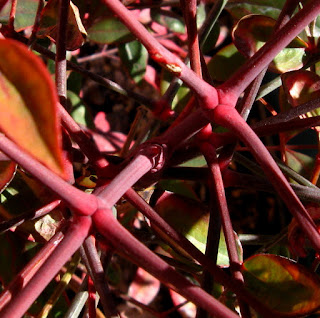(After a brief derailment last Wednesday, I am back on track today, ready to remember that when we struggle to find beauty in our circumstances, looking at them more closely often helps—as does counting our blessings.)
In the very first of Arthur Conan Doyle's Sherlock Holmes mysteries, A Study in Scarlet, the great detective tells Watson, "There's the scarlet thread of murder running through the colourless skein of life, and our duty is to unravel it, and isolate it, and expose every inch of it." Then, in what one can't help but feel is an anti-climax, he adds, "And now for lunch..."
I'm afraid I don't have anything quite as racy as revenge or poison pills to offer with the toasted cheese sandwiches and tomato-cumin soup, but really, that's probably for the best. We shall content ourselves with enjoying the more benign scarlet threads that run through the colorless skein of winter, savor our meal with perhaps a cup of tea afterward, and go on from there. (And we will not wax rhapsodical about some violinist's transcription of a "little thing of Chopin's," chirping "Tra-la-la-lira-lira-lay" and "caroling away like a lark," as Holmes apparently did, so you can all relax.)
Or are the scarlet threads benign? I find myself tugging at a moral thread these days. (You can all tense up again.) It is tied to Nandina domestica or "Heavenly bamboo," an ornamental shrub introduced from east Asia. I love this species for its winter color in many shades of red—a color that enlivens stems, leaves, and berries—as well as for its delicacy and for its translucent glow in sunshine. But as with so many introduced species, it is invasive in the right circumstances. While I don't think that the dry climate of Albuquerque counts as the right circumstance, I can't be sure. It doesn't seem to invade in people's yards, but birds do eat the berries and spread the seeds elsewhere, where vigorously growing seedlings might disturb the balance of an already fragile ecosystem. And yet those gorgeous scarlet stems and tangerine-orange leaves...I'm almost willing to be immoral and grow an invasive species for their sake.
 Well, really, I am willing. I do grow it. I have it growing in a large container, which is one of those compromises that pleases no one, including the Nandina domestica. On the one hand, in a pot its root system can't possibly spread out of bounds and invade; on the other, it requires extra water in order to thrive. It hasn't flowered and produced berries yet, but surely it is only a matter of time until it does. Once it does bear fruit and the birds find it, then the seeds will be dispersed far and wide. And yet, without delving too deeply into the mysteries of birds' digestive systems, birds do seem to function in an, um, "easy in, easy out" sort of way. "Far and wide" can be that far and wide: I can't imagine that the birds will carry the seeds far enough to deposit them in any damper, more congenial climate. Common sense and mildly deductive reasoning would indicate as much, but I don't know whether that's the case.
Well, really, I am willing. I do grow it. I have it growing in a large container, which is one of those compromises that pleases no one, including the Nandina domestica. On the one hand, in a pot its root system can't possibly spread out of bounds and invade; on the other, it requires extra water in order to thrive. It hasn't flowered and produced berries yet, but surely it is only a matter of time until it does. Once it does bear fruit and the birds find it, then the seeds will be dispersed far and wide. And yet, without delving too deeply into the mysteries of birds' digestive systems, birds do seem to function in an, um, "easy in, easy out" sort of way. "Far and wide" can be that far and wide: I can't imagine that the birds will carry the seeds far enough to deposit them in any damper, more congenial climate. Common sense and mildly deductive reasoning would indicate as much, but I don't know whether that's the case. I'm not actually losing sleep over this (I expect I'll just trim any berries before they ripen—another compromise that pleases no one), but it does illustrate in a way that never fails to disconcert me how small choices can have broad effects—effects for which we are responsible. It's a conundrum, but one, frankly, that I care about more in June than I do in January, when Nandina domestica casts a glow over the landscape. During the dead season it's a pleasure to unravel the scarlet threads, isolate them, and expose every inch of them—a guilty pleasure, but a pleasure nonetheless. And now for dinner.
(It's still anti-climactic.)























